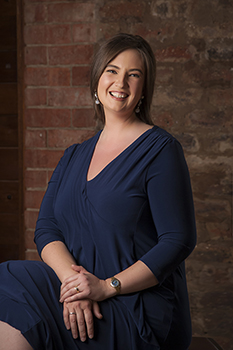
For Dr Matildie Thom Wium, the
rewarding part of teaching is “the
moments of synergy with a group of
students” and when she senses that she
could, for instance, help them to better
understand a music selection.
Photo: Sonia Small
Being part of the Vice-Chancellor’s Prestige Scholars Programme (PSP) has opened doors for Dr Matildie Thom Wium. She is able to better plan her research, and the overseas trips she has to undertake for this helps to develop her skills.
The senior lecturer in the Odeion School of Music (OSM) at the University of the Free State (UFS) says these are some of the advantages the PSP holds for her.
She attended two international conferences this year – in London in January, and in New York in August. Furthermore, she is working on musical analysis with Prof Timothy Jackson at the University of North Texas, US from 12 September 2016 to 31 December 2016. Prof Jackson is a research professor and was one of her PhD promoters.
Conferences contribute to her vision
“I think the PSP is a fantastic initiative,” says Dr Thom Wium, whose husband Daniël Wium is a lecturer in Astrophysics at the UFS. She says the reseach support from the PSP is amazing. “In addition, the writing retreats offered by the PSP help to set time aside during the busy semester to work on articles.”
“I think the PSP is a fantastic initiative.”
The conference in London was on operatic practice in the 19th century. In the US, Dr Thom Wium, who has been working at the UFS since 2007, also participated in a panel discussion on this topic. “It means a lot for my vision as an academic to participate in conferences where I have the opportunity to meet and exchange thoughts with the people whose work I read and cite.”
Involvement in SA equally important
However, she believes that it is equally important to stay involved locally. At the conference of the South African Society for Research in Music, which was hosted by the OSM from 25 to 27 August 2016, she presented a paper on composer Arnold van Wyk and performed a song cycle by him. She did research on Van Wyk for her PhD.